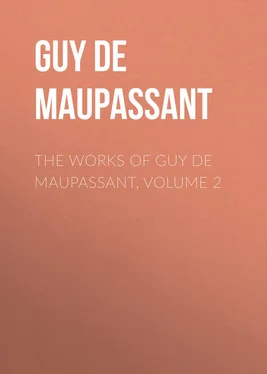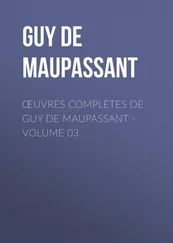Guy Maupassant - The Works of Guy de Maupassant, Volume 2
Здесь есть возможность читать онлайн «Guy Maupassant - The Works of Guy de Maupassant, Volume 2» — ознакомительный отрывок электронной книги совершенно бесплатно, а после прочтения отрывка купить полную версию. В некоторых случаях можно слушать аудио, скачать через торрент в формате fb2 и присутствует краткое содержание. Жанр: literature_19, foreign_antique, foreign_prose, на английском языке. Описание произведения, (предисловие) а так же отзывы посетителей доступны на портале библиотеки ЛибКат.
- Название:The Works of Guy de Maupassant, Volume 2
- Автор:
- Жанр:
- Год:неизвестен
- ISBN:нет данных
- Рейтинг книги:5 / 5. Голосов: 1
-
Избранное:Добавить в избранное
- Отзывы:
-
Ваша оценка:
- 100
- 1
- 2
- 3
- 4
- 5
The Works of Guy de Maupassant, Volume 2: краткое содержание, описание и аннотация
Предлагаем к чтению аннотацию, описание, краткое содержание или предисловие (зависит от того, что написал сам автор книги «The Works of Guy de Maupassant, Volume 2»). Если вы не нашли необходимую информацию о книге — напишите в комментариях, мы постараемся отыскать её.
The Works of Guy de Maupassant, Volume 2 — читать онлайн ознакомительный отрывок
Ниже представлен текст книги, разбитый по страницам. Система сохранения места последней прочитанной страницы, позволяет с удобством читать онлайн бесплатно книгу «The Works of Guy de Maupassant, Volume 2», без необходимости каждый раз заново искать на чём Вы остановились. Поставьте закладку, и сможете в любой момент перейти на страницу, на которой закончили чтение.
Интервал:
Закладка:
For four months he felt the pain of that meeting in his heart. Every night he saw the three again, happy and tranquil, father, mother and child walking on the boulevard before going in to dinner, and that new vision effaced the old one. It was another matter, another hallucination now, and also a fresh pain. Little George, his little George, the child he had so much loved and so often kissed formerly, disappeared in the far distance, and he saw a new one, like a brother of the first, a little boy with bare legs, who did not know him! He suffered terribly at that thought. The child's love was dead; there was no bond between them; the child would not have held out his arms when he saw him. He had even looked at him angrily.
Then, by degrees he grew calmer, his mental torture diminished, the image that had appeared to his eyes and which haunted his nights became more indistinct and less frequent. He began once more to live nearly like everybody else, like all those idle people who drink beer off marble topped tables and wear out the seats of their trousers on the threadbare velvet of the couches.
He grew old amidst the smoke from the pipes, lost his hair under the gas lights, looked upon his weekly bath, on his fortnightly visit to the barber's to have his hair cut, and on the purchase of a new coat or hat, as an event. When he got to his café in a new hat covering he used to look at himself in the glass for a long time before sitting down, and took it off and put it on again several times following, and at last asked his friend, the lady at the bar, who was watching him with interest, whether she thought it suited him.
Two or three times a year he went to the theater, and in the summer he sometimes spent his evenings at one of the open air concerts in the Champs-Elysées . He brought back from them some airs which ran in his head for several weeks, and which he even hummed, beating time with his foot, while he was drinking his beer, and so the years followed each other, slow, monotonous and short, because they were quite uneventful.
He did not feel them glide past him. He went on towards death without fear or agitation, sitting at a table in a café , and only the great glass against which he rested his head, which was every day becoming balder, reflected the ravages of time which flies and devours men, poor men.
He only very rarely now thought of the terrible drama which had wrecked his life, for twenty years had passed since that terrible evening, but the life he had led since then had worn him out, and the landlord of his café would often say to him: "You ought to pull yourself together a little, Monsieur Parent; you should get some fresh air and go into the country; I assure you that you have changed very much within the last few months." And when his customer had gone out, he used to say to the barmaid: "That poor Monsieur Parent is booked for another world; it is no good never to go out of Paris. Advise him to go out of town for a day occasionally; he has confidence in you. It is nice weather, and will do him good." And she, full of pity and good will for such a regular customer, said to Parent every day: "Come, Monsieur, make up your mind to get a little fresh air; it is so charming in the country when the weather is fine. Oh! If I could, I would spend my life there."
And she told him her dreams, the simple and poetical dreams of all the poor girls who are shut up from one year's end to the other in a shop and who see the noisy life of the streets go while they think of the calm and pleasant life in the country, of life under the trees, under the bright sun shining on the meadows, of deep woods and clear rivers, of cows lying in the grass, and of all the different flowers, blue, red, yellow, purple, lilac, pink and white, which are so pretty, so fresh, so sweet, all the wild flowers which one picks as one walks, and makes into large nosegays.
She liked to speak to him frequently of her continual, unrealized and unrealizable longing, and he, an old man without hope, was fond of listening to her, and used to go and sit near the counter to talk to Mademoiselle Zoé and to discuss the country with her. Then, by degrees he was seized by a vague desire to go just once and see whether it was really so pleasant there, as she said, outside the walls of the great city, and so one morning he said to her: "Do you know where one can get a good lunch in the neighborhood of Paris?" "Go to the Terrace at Saint-Germain; it is delightful there!"
He had been there formerly, just when he had got engaged, and so he made up his mind to go there again, and he chose a Sunday without any special reason, but merely because people generally do go out on Sundays, even when they have nothing to do all the week, and so one Sunday morning he went to Saint-Germain. It was at the beginning of July, on a very bright and hot day. Sitting by the door of the railway-carriage, he watched the trees and the strangely built little houses in the outskirts of Paris fly past. He felt low-spirited, and vexed at having yielded to that new longing, and at having broken through his usual habits. The view, which was continually changing, and always the same, wearied him. He was thirsty; he would have liked to get out at every station and sit down in the café which he saw outside and drink a bock or two, and then take the first train back to Paris. And then, the journey seemed very long to him. He used to remain sitting for whole days, as long as he had the same motionless objects before his eyes, but he found it very trying and fatiguing to remain sitting while he was being whirled along, and to see the whole country fly by, while he himself was motionless.
However, he found the Seine interesting, every time he crossed it. Under the bridge at Chatou he saw some skiffs going at great pace under the vigorous strokes of the bare-armed oarsmen, and he thought: "There are some fellows who are certainly enjoying themselves!" And then the train entered the tunnel just before you get to the station at Saint-Germain, and soon stopped at the arrival platform, where Parent got out, and walked slowly, for he already felt tired, towards the Terrace , with his hands behind his back, and when he got to the iron balustrade, he stopped to look at the distant horizon. The vast plain spread out before him like the sea, green, and studded with large villages, almost as populous as towns. White roads crossed it, and it was well wooded in places; the ponds at Vesinet glistened like plates of silver, and the distant ridges of Sannois and Argenteuil were covered with light, bluish mist, so that they could scarcely be distinguished. The sun bathed the whole landscape in its full, warm light, and the Seine, which twined like an endless serpent through the plain, flowed round the villages and along the slopes, and Parent inhaled the warm breeze which seemed to make his heart young again, to enliven his spirits and to vivify his blood, and said to himself: "It is very nice here."
Then he went on a few steps, and stopped again to look about him, and the utter misery of his existence seemed to be brought out into full relief, by the intense light which inundated the country. He saw his twenty years of café -life, dull, monotonous, heart-breaking. He might have traveled like others did, have gone amongst foreigners, to unknown countries beyond the sea, have interested himself somewhat in everything which other men are passionately devoted to, in arts and sciences, he might have enjoyed life in a thousand forms, that mysterious life which is either charming or painful, constantly changing, always inexplicable and strange. Now, however, it was too late. He would go on drinking bock after bock until he died, without any family, without friends, without hope, without any curiosity about anything, and he was seized with a feeling of misery and a wish to run away, to hide himself in Paris, in his café and his befuddlement! All the thoughts, all the dreams, all the desires which are dormant in the sloth of stagnating hearts, had reawakened, being brought to life by those rays of sunlight on the plain.
Читать дальшеИнтервал:
Закладка:
Похожие книги на «The Works of Guy de Maupassant, Volume 2»
Представляем Вашему вниманию похожие книги на «The Works of Guy de Maupassant, Volume 2» списком для выбора. Мы отобрали схожую по названию и смыслу литературу в надежде предоставить читателям больше вариантов отыскать новые, интересные, ещё непрочитанные произведения.
Обсуждение, отзывы о книге «The Works of Guy de Maupassant, Volume 2» и просто собственные мнения читателей. Оставьте ваши комментарии, напишите, что Вы думаете о произведении, его смысле или главных героях. Укажите что конкретно понравилось, а что нет, и почему Вы так считаете.












